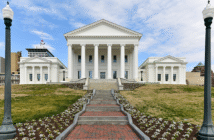
By A.J. Kaufman, Managing Editor
The zoning legalities and rules surrounding data centers within our region and across the nation can be confusing and occasionally controversial. With that in mind, the Business Journal felt contacting a local expert to clarify some information would be prudent.
Michael Parker, Director of Economic Development for NETWORKS Sullivan Partnership, said he believes communities in Northeast Tennessee are generally supportive of modern infrastructure and industry advancements in artificial intelligence, or AI.
However, he adds that recent crypto-mining experiments “have spotlighted major drawbacks within this arena,” such as loud noise, visual intrusion, zoning confusion, property value erosion and community frustration.
“Communities across the country, especially in rural or semi-rural areas, are increasingly taking measures to protect themselves from the negative impacts of data centers, especially cryptocurrency mining facilities,” Parker told the Business Journal via email. “By crafting clear land-use definitions, performance requirements, conditional-use processes and strong public engagement, NETWORKS supports, and aims to guide, data center growth in a way that captures the benefits while preserving community character and residents’ peace of mind.”
Parker noted that NETWORKS is in the process of reviewing its existing Covenants & Restrictions that pertain to the area’s industrial parks that currently allow data centers as a permittable use.
“These new land use restrictions will increase the accountability of the data centers while also providing our local communities more enforceability to ensure that all data center related projects adhere to the strict development and usage policies in place,” he explained. “In addition to our local land use restrictions, all communities within Sullivan County have applicable zoning ordinances that guide and limit development, including data center related projects. NETWORKS is here to support its communities and assist them in recruiting industry that align with goals and needs.”
A data center is a physical space — a room, building or multi-building facility — used to house IT infrastructure, especially computer systems. The sites most often serve as a centralized location for organizations to store, manage or process data.
There are more than 5,000 data centers at recent count in the U.S., according to Statista. This number far outpaces other leading countries, like Germany, the United Kingdom and China.
Virginia has long been home to the country’s largest cluster of data centers, with more than 300, primarily located in Northern Virginia.
But data center in northeast Tennessee could also be on the horizon.
One of the nation’s largest Bitcoin mining companies is looking to open a 30-megawatt facility in Mountain City on 50 acres at Highway 421 and Rainbow Road, not far from Johnson County Community Hospital.
Mountain City Mayor Jerry Jordan said earlier this spring that the plan involved a $40 to $50 million investment that would yield “significant property tax” if it materialized.
After some complaints from Mountain City residents about the proposed data center, town leaders organized a tour of a similar facility in Georgia to see what the project would look like. Jordan says he went to make sure that the facility would benefit the Mountain City community and not be a hindrance. After the tour, he feels more confident that they will be.
Across the state line, U.S. Rep. Morgan Griffith says the current budget bill making its way through Congress includes provisions to incentivize energy and data center investment in Southwest Virginia. He claims data centers in the U.S. will be cleaner than ones in China, specifically due to our stricter pollution controls.



